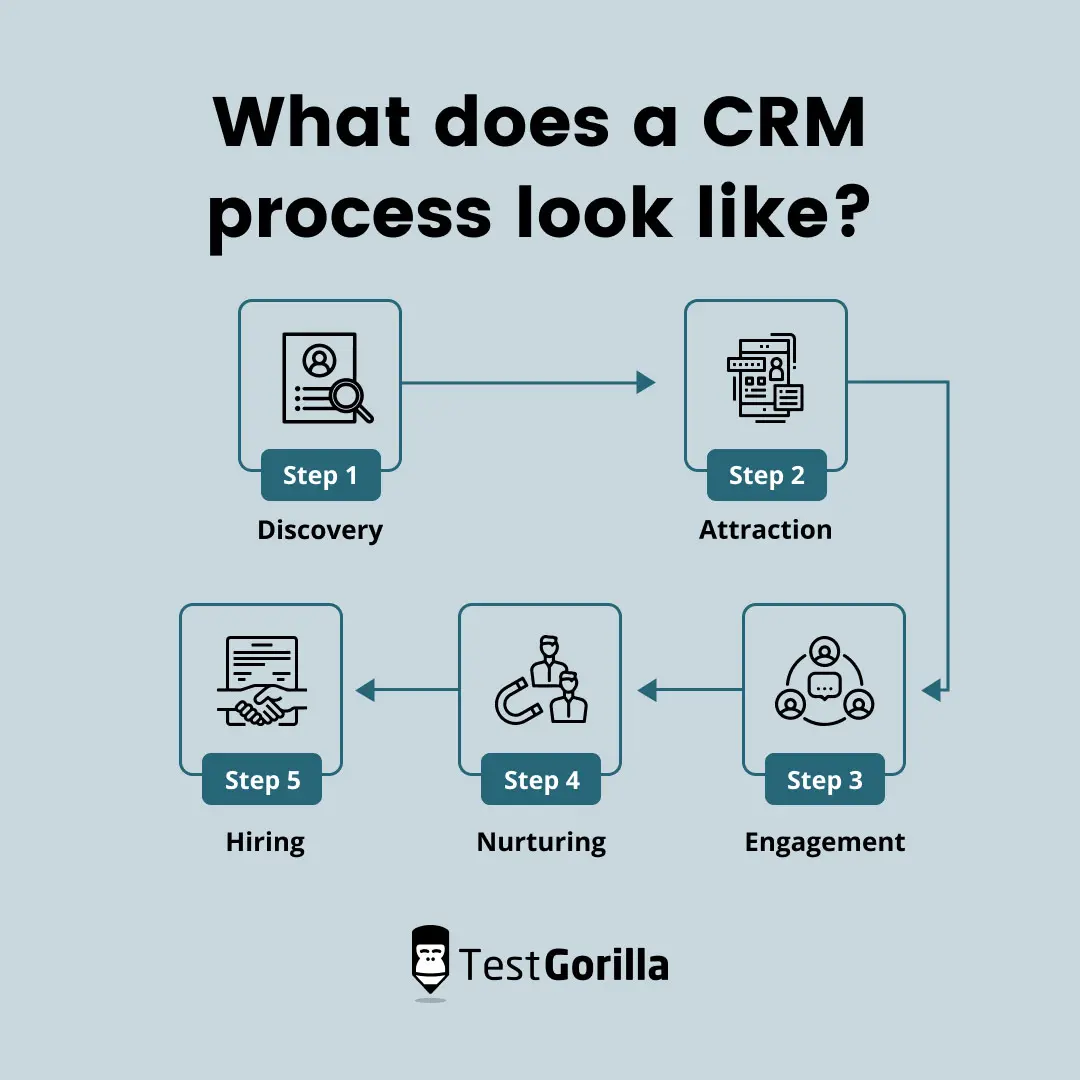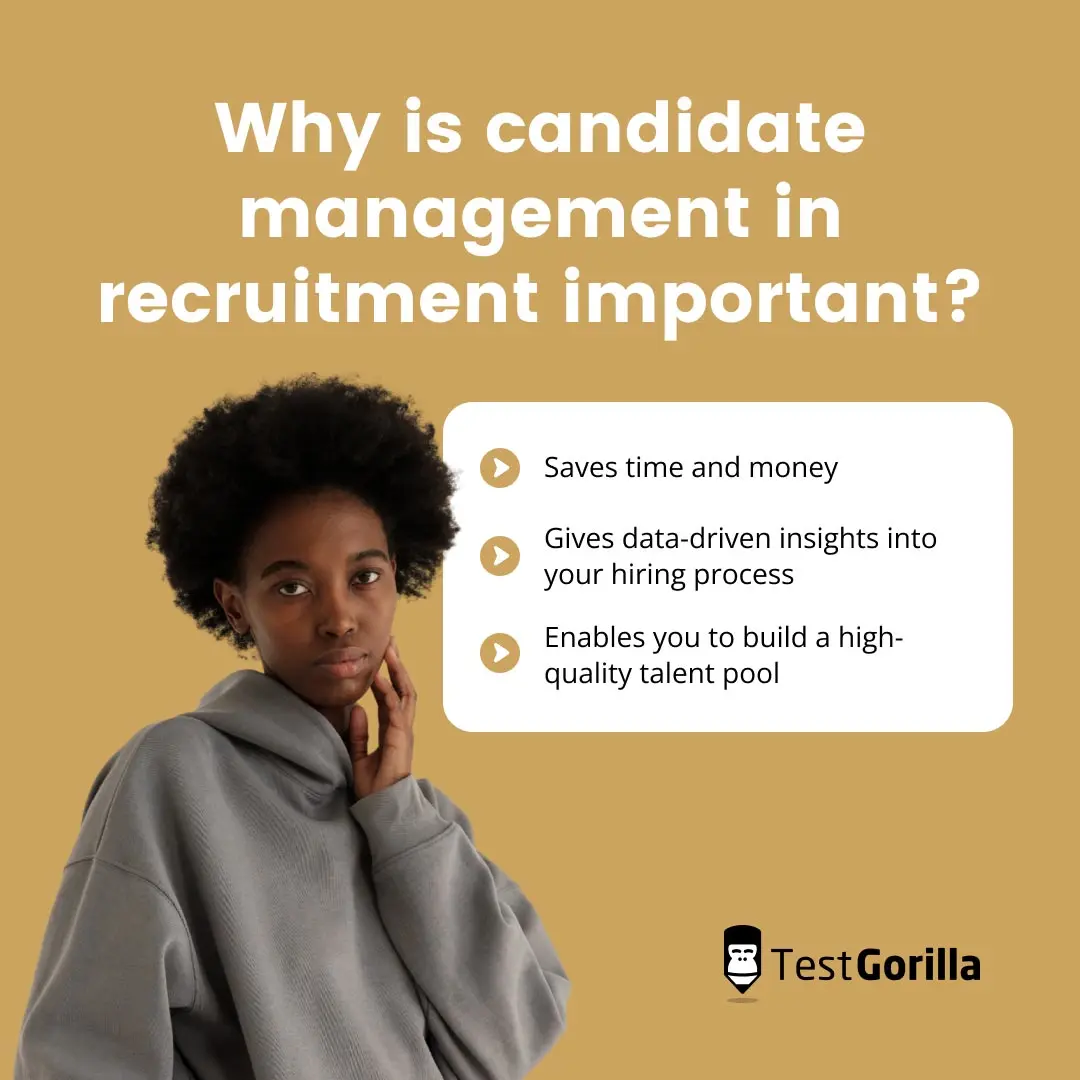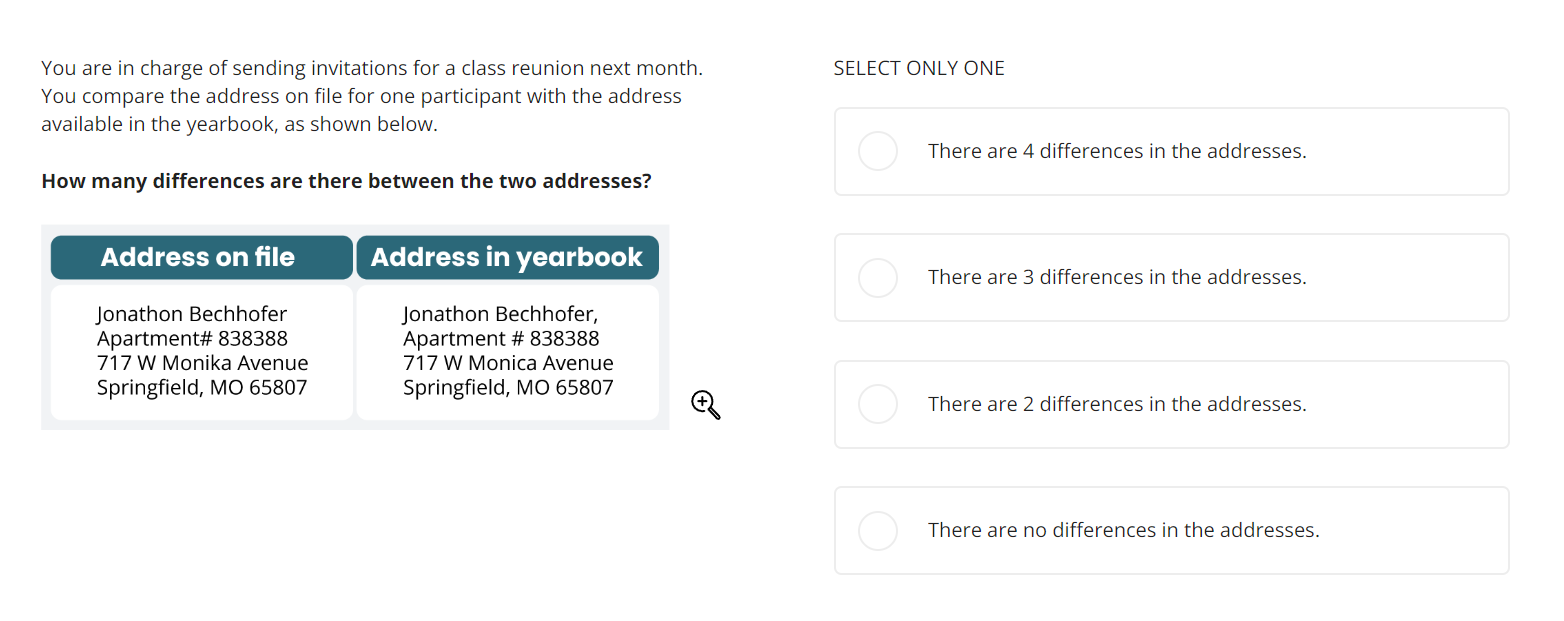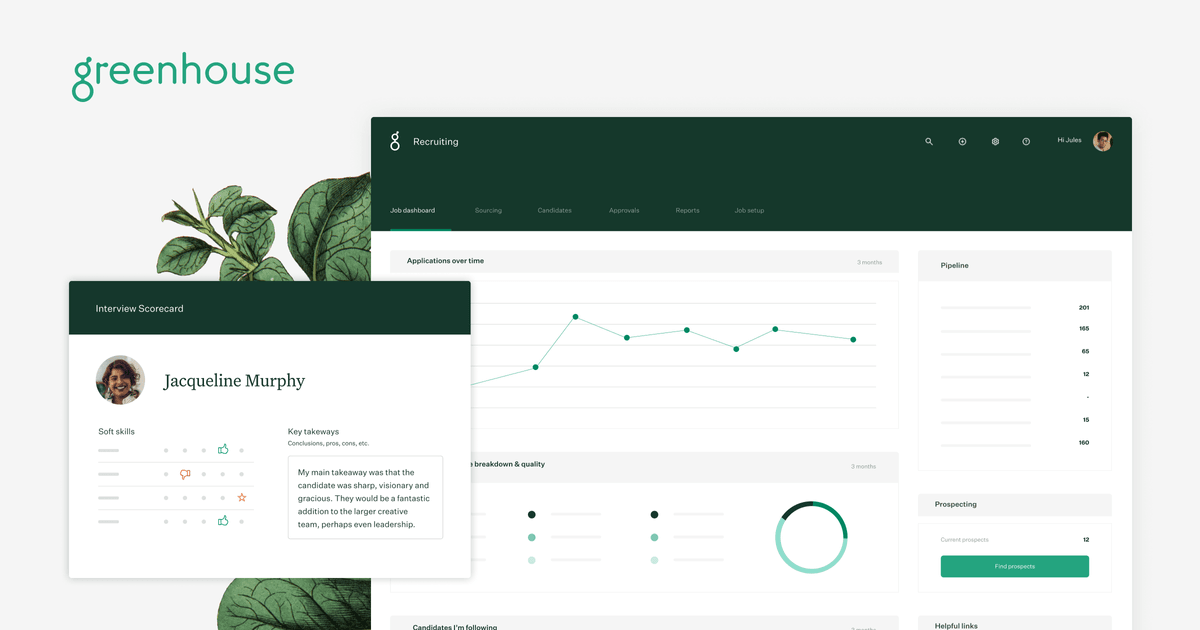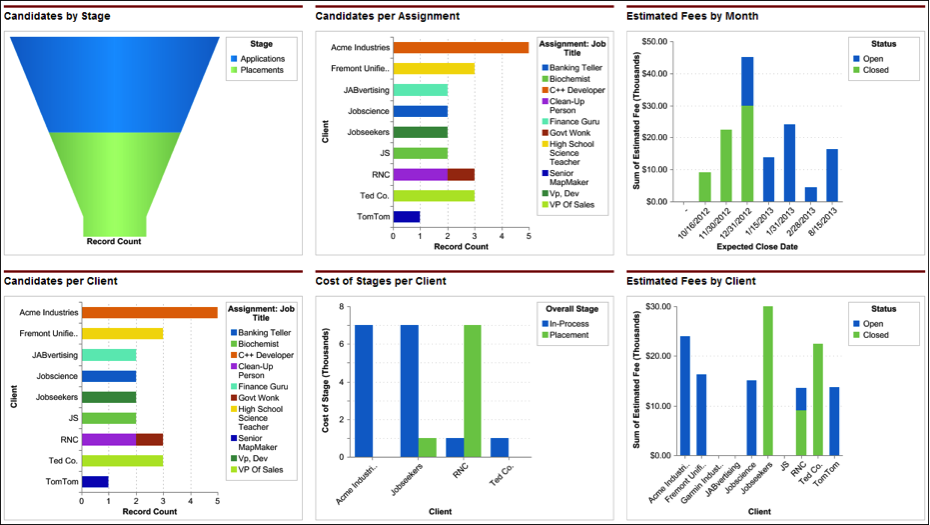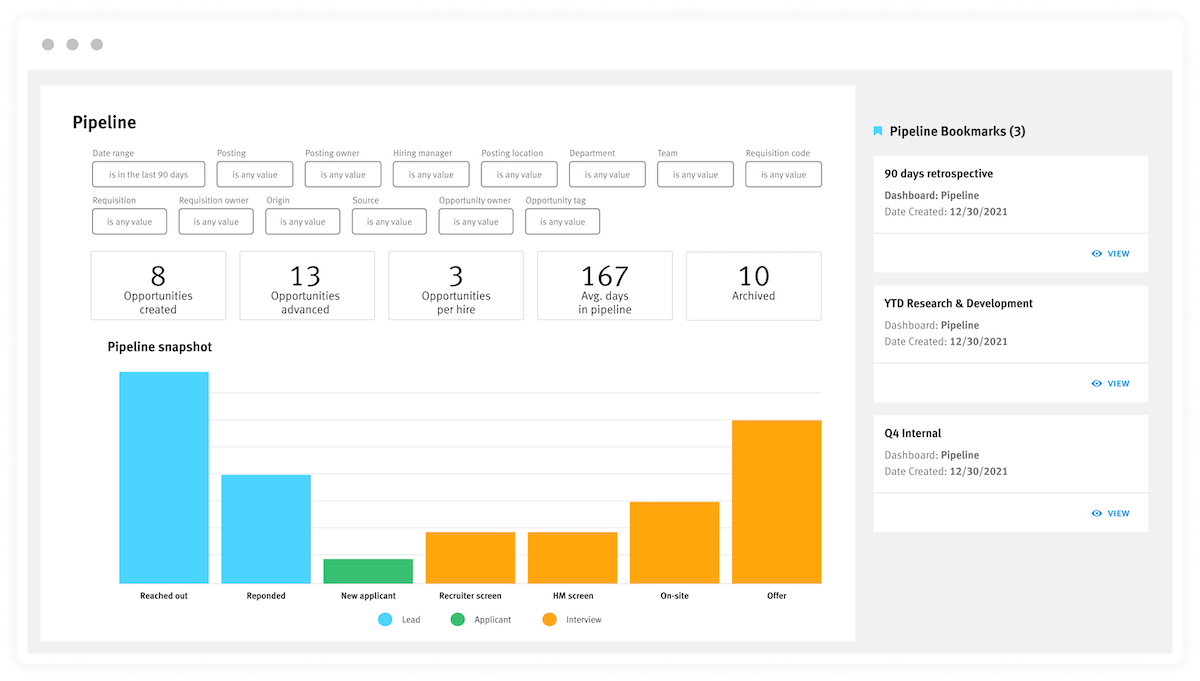Candidates are more important than ever in the current market, so it's important to ensure they have a positive experience.
If they don’t get a positive experience, they tell their friends, avoid reapplying to your company, and even leave you a bad review online.
Moreover, 48% of workers have higher expectations of how employers should treat candidates than just a few short years ago. [1]
How do you meet these expectations?
Turn to candidate relationship management – a strategy that boosts candidate communication, improves employer branding, and helps new hires get started in their roles.
This blog discusses the definition of candidate relationship management, its importance, the main strategies to adopt, and the top tools you can use.
If you’re already familiar with the basics, go ahead and jump ahead to our best practices.
Table of contents
- What is candidate relationship management?
- Why is candidate management in recruitment important?
- The benefits of candidate relationship management
- 7 best practices for leveraging candidate relationship management to acquire top talent
- 4 candidate relationship management tools to improve your talent acquisition strategy
- 3 examples of companies succeeding with candidate relationship management as a talent acquisition strategy
- Build a powerful talent pipeline with candidate relationship management
What is candidate relationship management?
Candidate relationship management is a talent acquisition strategy for identifying qualified candidates, attracting them to open roles, and maintaining a long-term connection with them.
It involves building a recruiting process – supported by technology and multiple touchpoints – that engages with applicants and creates a positive candidate experience across the recruitment cycle.
An effective candidate relationship management (CRM) strategy helps organizations handle large amounts of applications and still treat candidates as individuals.
In other words, it enables companies to create connections with the best candidates, which influences their decision to join a company (or reapply if they’re unsuccessful).
Candidate relationship management also refers to the software or technology that facilitates this process – commonly referred to as CRM software or a CRM tool.
Candidate relationship management software usually has these key features:
The ability to send personalized messages to applicants
Track applicant information with candidate profiles
Move prospects through an approachable recruitment funnel
Leverage data and analytics
Automate tedious work so hiring managers can focus on what’s important
With the right candidate relationship management tools and strategies, employers can also better react to upcoming talent acquisition trends, like data-driven recruiting and candidate nurturing, and leverage them to improve their quality of hire and cut costs.
What does a CRM process look like?
The candidate relationship management process stretches across all stages of the candidate journey, from learning about a company to joining the organization.
Here’s how a CRM strategy plays out over each phase of the employment process:
Discovery: In the discovery phase, employers find potential candidates through job boards, career sites, employee referral programs, or social media.
Attraction: In the attraction phase, employers gather interest from applicants through marketing and branding efforts, such as website content or LinkedIn posts.
Engagement: In the engagement phase, employers focus on certain candidates and communicate with them, usually about the recruitment process, upcoming events, or information about the company.
Nurturing: In the nurturing phase, hiring teams keep talent interested by keeping in contact; this might be with updates about the company or with roles relevant to the applicant.
Hiring: In the hiring phase, employers secure new talent that they engaged, evaluated, and connected with in the previous four stages.
Each of these stages works together to ensure that top talent remains interested and engaged, eager to join your company, and fully aware of the opportunities available.
Why is candidate management in recruitment important?
Because of global talent shortages, we’re living in a candidate’s market. This means it’s important to consider your potential hires’ wants and needs.
Candidates want thorough communication and feedback. They also want details about your company – and they want to know why it is an exciting place to work.
CRM spreads a positive employer brand, increases referrals, and even makes unsuccessful candidates spread positive news and try again when another position opens.
Your star treatment of candidates becomes part of your corporate identity.
Candidate relationship management strategy is also growing in popularity owing to the difficulty of managing multiple open roles and the need to organize and interpret candidate feedback from various sources.
The number of candidates per application is rising because of increasingly more employers recruiting internationally and remotely.
Candidate relationship management helps on both fronts, streamlining workflows and improving the candidate experience to put employers in a competitive position for top talent.
Here are the main reasons why you should consider candidate relationship management to hire the best talent:
Saves time and money: Candidate relationship management systems save time and money by automating tedious tasks and candidate communication
Gives data-driven insights into your hiring process: Candidate relationship management software enables you to leverage important metrics, like source effectiveness and careers page bounce rate
Enables you to build a high-quality talent pool: CRM helps companies survive tough job markets by enabling them to re-engage with talent from previous recruitment efforts and close tough-to-fill roles
As mentioned above, candidate management in recruitment is also important for your candidates. It streamlines your entire hiring process and improves the candidate experience, leading to better retention and time to hire.
Candidates appreciate seeing a human side to your company through dedicated communication. Even automated messages are “human” – they show that you respect a candidate’s time.
Unsuccessful candidates also benefit from follow-ups and hearing a definite “no.” Plus, they remain in the system for future recruitment drives, which is an excellent part of a CRM strategy.
The benefits of candidate relationship management
Properly done, a candidate relationship management strategy is a powerful tool for HR professionals to attract great candidates and efficiently organize their hiring process.
Here are the top benefits to expect:
Advantage | Description |
|---|---|
Promotes a great candidate experience
| - Candidate nurturing creates a positive candidate experience - Research shows that 82% of candidates share a great hiring experience with others[2] |
Gets the entire employee experience off on the right foot | CRM carries through recruitment into your onboarding best practices, ensuring that new hires get a great first impression of your organization |
Enables you to act fast on passive candidates | - CRM enables you to nurture strong relationships with passive candidates - When candidates go from “passive” to “active,” you’ll be at the top of their list |
Helps you build detailed candidate profiles | - Gathering candidate information enables you to build a detailed candidate profile - This profile not only informs your processes and selection but also helps you personalize outreach |
Boosts candidate engagement | - CRM maintains candidate engagement during long hiring cycles, making applicants less likely to lose interest, withdraw their application, or ghost - More than 25% of candidates drop out of the hiring process, and 45% consider it |
Improves employer branding | Personalizing communication, streamlining the hiring process, and respecting your candidates’ time build a great employer brand |
Improving employer branding is one of the biggest reasons to enhance candidate relationship management.
Spreading your reputation as a great employer that treats candidates right heavily impacts your talent management efforts:
86% of employees and job seekers research company reviews and ratings to decide on where to apply for a job
75% of active job seekers are likely to apply for a job if the employer actively manages its employer brand
92% of people would consider changing jobs if offered a role with a company with an excellent corporate reputation[3]
7 best practices for leveraging candidate relationship management to acquire top talent
Many companies put all their faith into great software to help their CRM strategy, and – don’t get us wrong – while software is important…
Attracting and hiring the best employees requires more than a great candidate relationship management platform.
A CRM strategy needs concentrated efforts to put the needs of candidates at the forefront of your hiring process, like prioritizing communication or using fair hiring practices.
This section discusses candidate relationship management best practices that can help you attract and hire great talent.
By the way, we cover our top recruitment CRM software choices in the next section.
Strategies for candidate relationship management: A summary
Strategies | Description |
1. Build the right tech stack | Choose a tech stack that facilitates your candidate relationship management strategy |
2. Leverage recruitment marketing | Promote your company and engage candidates with active marketing efforts |
3. Prioritize candidate communication | Keep in touch with candidates, engaging them with follow-ups and letting them know when they didn’t succeed |
4. Engage in active and passive recruiting | Nurture passive candidates with CRM tactics, like sending informative email campaigns |
5. Build a positive employer brand | Convey your value as an employer to attract and connect with quality candidates |
6. Use analytics to understand hiring shortfalls | Monitor and measure CRM metrics to understand why applicants are dropping out |
7. Smoothly integrate talent assessments | Use skills tests to create a streamlined and fair process |
1. Build the right tech stack
Candidate relationship management tools aren’t everything, but they’re important to an efficient process, so getting one isn’t as simple as buying the first one you see.
Choose the right CRM system for your organization and combine it with other tools to optimize the process.
Here are a few suggestions for software to add to your CRM tech stack:
Video conferencing software
Employee referral platforms
Talent assessment software
Let’s quickly expand on that last recommendation: Talent assessments are a great way to promote transparency and accuracy in hiring, improving your overall CRM strategy. They also help you gather important metrics, like candidate quality.
They sometimes also integrate into certain candidate relationship management systems. For example, Testgorilla integrates with the powerful candidate relationship management software Greenhouse.
For more information, read our full guide on talent acquisition technology.
2. Leverage recruitment marketing
Recruitment marketing is when a company essentially markets itself to gain quality candidates. It usually takes place throughout the entire candidate lifecycle.
It’s a great way to attract candidates whose values align with yours.
It also encourages solid communication, making it ideal to pair with a candidate relationship management strategy. Both tactics aim to engage candidates and promote the value your company brings to them.
We aren’t the first to consider this pairing – many candidate relationship management tools also have recruitment marketing features.
These features include but aren’t limited to emailing candidates from your internal database and monitoring marketing analytics.
3. Prioritize candidate communication
Communication is the most effective way to build connections with candidates, but it’s also a common shortcoming in many hiring processes.
One study found that 63% of candidates think employers do not communicate adequately.
Many applicants complain about hearing back months after their initial application, receiving a generic “sorry” email. Even worse, some applicants hear nothing back from employers, even after attending an interview.
A great way to stand out from your competitors is to respond to all your applicants.
Thank them for their time, let them know if they’re moving forward, and provide feedback about their skills or applications. They may even reapply after working on the feedback you gave (we have a real-life example of this below).
You can use your CRM tool to personalize these messages so they don’t feel robotic or unfeeling. These show respect for a candidate’s time and give them a better impression of your company.
4. Engage in active and passive recruiting
Active recruiting is the most common form of hiring, but passive recruiting is an excellent addition to your talent acquisition toolbox.
Here’s a quick definition:
Active recruiting: An employer has an open role to fill and puts out ads. Interested candidates apply in response.
Passive recruiting: An employer scopes out likely professionals who are already employed, then manages and nurtures the relationship until the individual either switches companies or naturally leaves their role and becomes “active.”
A candidate relationship management strategy makes passive recruiting simple and approachable.
CRM helps you get to know candidates, build detailed profiles, and nurture a slow and steady relationship. These are all key strategies to engage passive candidates.
For example, you can set a cadence on your CRM to send informative emails to your passive candidates every few months – just make sure the communication is tailored to their interests and the positions they applied to.
5. Build a positive employer brand
Candidates start building a relationship with your company well before their first interaction with a recruiter or hiring manager.
Many applicants have a perception of your organization based on:
Direct knowledge of your products or services
A shared network that overlaps with your employee base
Third-party employer review sites
Hopefully, these tell a positive story, but even if they don’t, your company can influence candidate decisions with employer branding.
When your company invests in its branding, it isn’t just a marketing campaign; it’s a strategy that attracts great talent and starts candidate relationships off on the right foot.
There are many ways to improve your employer brand, such as promoting your learning and development opportunities, building a meaningful CSR strategy, or using social media recruitment tactics.
For example, a company might invest in employee spotlights to show off life at the organization. These could be social media posts talking about positive aspects of the company, such as an inclusive atmosphere or benefits (like flexible working hours and an on-site gym).
6. Use analytics to understand hiring shortfalls
In the past, it was difficult or impossible to properly leverage hiring data. However with technology like CRM software, employers can quickly analyze data and understand bottlenecks in the hiring process.
Natural candidate actions throughout the hiring process tell you a lot about what is or isn’t working during each stage of the candidate relationship management process.
Here are a few examples of how CRM metrics could benefit the hiring process:
Problem | Possible answer |
Your CRM shows that applicants are startling applications but not finishing them | Studies find that 60% are likely to abandon the process if it’s too long or complex.[4] |
Candidates are dropping out during the interview phase | Look into building a structured interview process |
Candidates don’t understand which skills are necessary for your roles | Make the recruitment process clear with skills-based job descriptions and role-specific skills assessments |
A great candidate relationship management strategy paired with data-driven software takes information from candidate experiences and turns it into actionable data to improve your recruiting process.
This section is just the tip of the iceberg. For more insights, read our full guide on data driven recruiting.
7. Smoothly integrate talent assessments
Talent assessment tests are an excellent addition to your candidate relationship management strategy for two major reasons:
They focus on an individual’s skills and promote a fair experience. In fact, close to 55% of candidates prefer a hiring process with talent assessments.
Many talent assessment systems, like TestGorilla, integrate seamlessly with CRM software
When candidates complete talent assessments, the test results are stored within your CRM software, so it’s quick and easy to highlight candidates based on their scores.
This method gives employers an objective and efficient manner to quantify and compare talent.
Here’s how to use them:
First, candidates complete a series of tests to gauge their skills and personalities. Below is a question from our Attention to Detail test.
Next, after the candidates have finished, you shortlist the best by sorting them by test scores:
After this, the results can be stored in your CRM for future reference. This helps inform your hiring process.
For example, you might want to keep an eye on the candidates who score the highest as the hiring process progresses. You’ll also want to keep an eye on high-scoring but ultimately unsuccessful candidates for future recruiting efforts.
4 candidate relationship management tools to improve your talent acquisition strategy
Candidate relationship management software helps HR professionals implement our seven best practices and get the most out of their strategy by automating relationship-building activities and keeping candidate information organized.
Here are four of the best CRM systems available:
CRM software provider | What it’s best for |
Greenhouse | Data and analytics |
Bullhorn | Scheduling and logistics |
Lever | Internal collaboration |
Avature | Custom configurations |
For each one, we discuss the following features to help you decide which is best for your organization:
Product overview
Key features
Pros and cons
Greenhouse
Product overview: Greenhouse’s CRM software helps organizations streamline and optimize their recruiting processes across talent sourcing, acquisition, and onboarding.
Key features: The Greenhouse platform has some impressive features, including:
Job posting and syndication
Candidate screening and assessment
Interview scheduling
Third-party integrations, including TestGorilla
Automated candidate communication
Here are its main pros and cons:
Pros | Cons |
- A large focus on data analytics - Provides HR functions with real-time insights into metrics and key performance indicators - Integration with talent assessment software so you can easily compare and track top candidates | Some users complain that it’s too bloated with features for small HR teams looking for simple functionality |
Bullhorn
Product overview: Bullhorn is CRM software that’s also an ATS, so it can handle candidate sourcing through to onboarding for a seamless hiring process.
Key features: Bullhorn’s software helps HR teams manage candidate relationships and close open positions with a long list of useful features, including:
Candidate search capabilities
Recruitment marketing
Advanced reporting
Third-party integrations, including TestGorilla
Here are its main pros and cons:
Pros | Cons |
- Easy access to applicant information - Readily available candidate tracking and comparison - Integration with TestGorilla enables you to view candidate results within your CRM | Some users feel that technical support and customer service could be more helpful |
Lever
Product overview: Lever’s platform is another combination CRM and ATS, which helps recruiters streamline the hiring process and build better relationships with candidates.
Lever also offers third-party integration with TestGorilla, to help you easily review test results.
Key features: Lever enables organizations to handle:
Job board and social media syndication
Interview scheduling
Feedback management
Recruiter collaboration
Here are its main pros and cons:
Pros | Cons |
- Excellent communication and collaboration capabilities - Enables hiring managers and other stakeholders to work together in real-time - Streamlined integration with TestGorilla talent assessments | A relatively high price tag |
Avature
Product overview: Avature provides a cloud-based CRM that helps employers manage the entire applicant process, from managing a talent community to structuring an engagement schedule.
Key features: Avature’s customizable software enables organizations to tailor the platform to their specific needs and workflows.
The tool includes a range of modules that cover:
Talent engagement management
Job requisition management
Interview scheduling
Offer management
Here are its main pros and cons:
Pros | Cons |
Reviews from HR professionals agree that Avature has excellent tracking interactions and communications | Users say that the platform is difficult for beginners to learn |
3 examples of companies succeeding with candidate relationship management as a talent acquisition strategy
Now that you’ve learnt about CRM best practices and the top recruitment CRM platforms, let’s take a look at three examples from successful companies to give you inspiration for building and improving your candidate relationship management strategy.
Companies with great candidate relationship management processes: A summary
Company | Why it’s successful |
Cigna | Provides candidates with interview tips and glimpses into life at the company |
Echo | Prepared candidates thoroughly for a new remote recruitment process |
Momentive | Improves the hiring experience through feedback |
The Cigna Group
The Cigna Group is a healthcare company with an excellent candidate relationship management strategy.
First, this company nails down a great best practice: It describes a typical hiring process from application to job offer.
This process enables candidates to familiarize themselves with the company and how it works. It sets them up for a successful candidate journey.
It also has an entire page for interview tips that advises candidates to research the company, reflect on their strengths, and be prepared to ask the interviewer questions.[5]
The business goes further into providing a great candidate experience by using social media recruiting – its “LifeAtCignaGroup” Instagram account posts about its people, events, and culture.[6]
Echo
Echo, a transportation management company, has a candidate relationship management strategy built around hiring remote employees.
This company had to respond to the remote needs we all faced in the past few years and still maintain its campus recruitment efforts.
When creating internship programs during such a difficult time, it took time to train its staff on remote hiring best practices.
It sent its intern candidates instructions on how to interview virtually. On top of that, it also put together content to help students learn about the company, including webinars and videos of employees to help them get a feel for company culture.[7]
This stellar system resulted in rave reviews from candidates.
Momentive
Momentive, an experience management company, embodies feedback as a core company value, so it was an issue when "lack of feedback" was a common candidate complaint.
This company realized there was a disconnect. Its processes made sure that the internal recruitment team was getting feedback via surveys, but the candidates didn't get the same treatment.
Momentive fixed this by adopting Greenhouse, one of our CRM software recommendations.
First, the team compiled candidate experience reports within the software and combined them with external research to learn about the current state of candidate feedback. The company then used this information to build guidelines and best practices for a feedback system.
Now recruiters at Momentive offer a feedback call to candidates who are rejected after a job interview.
This system had amazing results. A survey shows that 75% of candidates say the feedback is very valuable, and 91% say they'd consider reapplying for another role at Momentive.[8]
Build a powerful talent pipeline with candidate relationship management
Nurturing candidates and providing them with a great experience is one of the most effective talent acquisition strategies you can use.
A CRM strategy helps you collect amazing candidates and engage them from start to finish.
Start by polishing up your employer branding and investing in a few great tools, such as candidate relationship management software and a talent assessment system.
The more you nurture relationships, the more top talent you gather for your current and future hiring efforts. For more information on this, read our guide on building a healthy talent pipeline.
If you’re considering adding talent assessments to your CRM strategy, look at more than 300 skills tests in our test library.
Sources
"Job Seekers Are Now in the Driver's Seat and Expect Next-Gen Recruiting and New Hire Experiences, Survey Finds". (October 30, 2018). CareerBuilder. Retrieved September 5, 2023. https://press.careerbuilder.com/2018-10-30-Job-Seekers-Are-Now-in-the-Drivers-Seat-and-Expect-Next-Gen-Recruiting-and-New-Hire-Experiences-Survey-Finds
Berthold, Shawna. "Why Candidate Experience Matters". Talentegy. Retrieved September 5, 2023. https://www.talentegy.com/blog/cxreport-businessimpacts
"40+ Stats For Companies to Keep In Mind for 2021". (2021). Glassdoor. Retrieved September 5, 2023. https://www.glassdoor.com/employers/resources/hr-and-recruiting-stats/
Csedrik, Alex. (February 26, 2019). “Companies Get The Short End Of The Stick With Long Hiring Processes”. WayUp. Retrieved September 15, 2023. https://www.wayup.com/employers/blog/companies-get-the-short-end-of-the-stick-with-long-hiring-processes
“How We Hire”. The Cigna Group. Retrieved September 15, 2023. https://jobs.thecignagroup.com/us/en/how-we-hire
“The Cigna Group Careers”. Instagram. Retrieved September 15, 2023. https://www.instagram.com/lifeatcignagroup/
"2021 RippleMatch Campus Forward Honoree - Echo Global Logistics". RippleMatch. Retrieved September 15, 2023. https://resources.ripplematch.com/2021-campus-forward-honoree-echo-global-logistics
"Momentive applies candidate feedback to transform their hiring process". Greenhouse. Retrieved September 15, 2023. https://grnhse-marketing-site-assets.s3.amazonaws.com/production/Greenhouse-customer-story-momentive-applies-candidate-feedback-to-transform-their-hiring-process_new.pdf
Related posts
Hire the best candidates with TestGorilla
Create pre-employment assessments in minutes to screen candidates, save time, and hire the best talent.
Latest posts
The best advice in pre-employment testing, in your inbox.
No spam. Unsubscribe at any time.

Hire the best. No bias. No stress.
Our screening tests identify the best candidates and make your hiring decisions faster, easier, and bias-free.
Free resources
This checklist covers key features you should look for when choosing a skills testing platform
This resource will help you develop an onboarding checklist for new hires.
How to assess your candidates' attention to detail.
Learn how to get human resources certified through HRCI or SHRM.
Learn how you can improve the level of talent at your company.
Learn how CapitalT reduced hiring bias with online skills assessments.
Learn how to make the resume process more efficient and more effective.
Improve your hiring strategy with these 7 critical recruitment metrics.
Learn how Sukhi decreased time spent reviewing resumes by 83%!
Hire more efficiently with these hacks that 99% of recruiters aren't using.
Make a business case for diversity and inclusion initiatives with this data.

